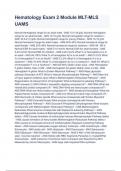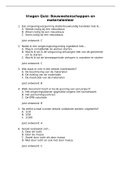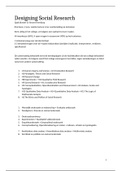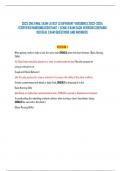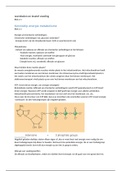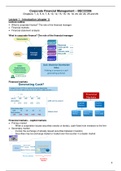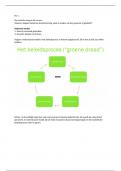Energy & Finance – Lecture Notes Week 1 and 2
Lecture notes Week 1
Gas market (3 regional markets USA, Europe and Asia)
- Supply; available capacity, flexibility to react, marginal costs, competition, policy measures
(subsidies + taxes)
- Demand; price sensitivity of consumers, income, external factors (temperature), policy
measures (subsidies + taxes)
Availability of gas to market depends on transports costs
- Pipelines
o High CAPEX (capital expenditure)
o OPEX increase with distance
o Most efficient for long distance
- LNG (Liquefied Natural Gas)
o Higher CAPEX, but lower OPEX
o Investments needed
o Most efficient for short distance
Increased LNG capacity and lower cost result in strong global intergarion.
Cost drive is price of oil as expected revenues from oil production affect the availability equipment for
gas production. Price differences due to political risks and inefficient allocation of capacity. In the
past no gas market; directly linked to oil price in EU.
Storage; flexibility
- Gas demand is highly volatile (temperature related)
- High fixed cost of pipelines
- Political risk; to reduce import dependency
Benefits of storage
- Balancing the gas system
- Intertemporal arbitrage of price differences
- Security of supply
- Stabilizes the gas price, expected prices depend on relative storage levels.
NL has hardly any storages, because Groningen gas field can as swing supplier.
Resource policies may affect (costs of) available supply.
Oil Market
Available resources are still abundant (scarcity).
Supply depends on reserves, opportunity costs and market power effects.
Global market but different prices exists due to quality (WTI, BRENT and OPEC benchmarks)
Demand for oil is still increasing (transport sector)
Market power of OPEC is not constant
- Call on OPEC versus actual production
- Non-conventional oil resources limit the market power
Short-term flexibility is modest
- Increasing production by non-OPEC countries takes time
Lecture notes Week 1
Gas market (3 regional markets USA, Europe and Asia)
- Supply; available capacity, flexibility to react, marginal costs, competition, policy measures
(subsidies + taxes)
- Demand; price sensitivity of consumers, income, external factors (temperature), policy
measures (subsidies + taxes)
Availability of gas to market depends on transports costs
- Pipelines
o High CAPEX (capital expenditure)
o OPEX increase with distance
o Most efficient for long distance
- LNG (Liquefied Natural Gas)
o Higher CAPEX, but lower OPEX
o Investments needed
o Most efficient for short distance
Increased LNG capacity and lower cost result in strong global intergarion.
Cost drive is price of oil as expected revenues from oil production affect the availability equipment for
gas production. Price differences due to political risks and inefficient allocation of capacity. In the
past no gas market; directly linked to oil price in EU.
Storage; flexibility
- Gas demand is highly volatile (temperature related)
- High fixed cost of pipelines
- Political risk; to reduce import dependency
Benefits of storage
- Balancing the gas system
- Intertemporal arbitrage of price differences
- Security of supply
- Stabilizes the gas price, expected prices depend on relative storage levels.
NL has hardly any storages, because Groningen gas field can as swing supplier.
Resource policies may affect (costs of) available supply.
Oil Market
Available resources are still abundant (scarcity).
Supply depends on reserves, opportunity costs and market power effects.
Global market but different prices exists due to quality (WTI, BRENT and OPEC benchmarks)
Demand for oil is still increasing (transport sector)
Market power of OPEC is not constant
- Call on OPEC versus actual production
- Non-conventional oil resources limit the market power
Short-term flexibility is modest
- Increasing production by non-OPEC countries takes time


